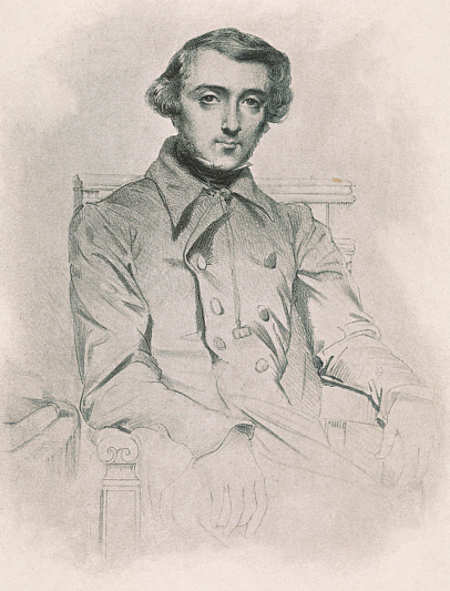
Have you ever noticed how it sometimes take an outside perspective to illuminate a complex situation? Sometimes it’s just impossible to see clearly when you’re neck deep in the quagmire yourself.
In the decades immediately after America’s last war with England (the War of 1812), Americans finally had time to truly consider who they were as a people.
You have to remember, that as the 1820s and 1830s passed by, the generation who had created this nation was beginning to die, leaving their children and grandchildren the responsibility of defining who exactly Americans were.
John Adams once famously said, “I must study politics and war that my sons may have liberty to study mathematics and philosophy. My sons ought to study mathematics and philosophy, geography, natural history, naval architecture, navigation, commerce, and agriculture, in order to give their children a right to study painting, poetry, music, architecture, statuary, tapestry, and porcelain.”
When the French diplomat and sociologist Alexis de Tocqueville traveled to America in 1831, the Americans he met were those second and third generations who were the beneficiaries of the John Adamses and George Washingtons.
De Tocqueville came to America with the intention of studying its prisons, of all things, and during the nine months he travelled by stagecoach, steamship and horseback, he did indeed visit many prisons. He even had time to interview every prisoner in the Eastern State Penitentiary in Washington D.C.
And while his subsequently report on his findings might have been informative to some in France, “On the Penitentiary System in the United States and Its Application in France” was certainly not an engaging read. In fact, Gustave de Beaumont, who had accompanied his friend on the trip, had largely written it, leaving de Tocqueville to write about a far more interesting topic: America.
In 1835, de Tocqueville published the first volume of “Democracy in America.” The book provided a broad analysis of the politics and culture the young Frenchman found in his travels through the country.
Much of what he saw in American life impressed de Tocqueville. He admired the individualism of America’s citizens, and was surprised at the stability of the country’s economy. He also noted the irony of the freedom-loving nation’s mistreatment of American Indians and its embrace of slavery. In particular, he was fascinated with the depth to which politics permeated all aspects of American life.
In one passage he states:
“The political activity which pervades the United States must be seen in order to be understood. No sooner do you set foot upon the American soil than you are stunned by the kind of tumult … Everything is in motion around you; here, the people of one quarter of a town are met to decide upon the building of a church; there, the election of a representative is going on; a little further the delegates of a district are posting to the town to consult upon some local improvements; or in another place the laborers of a village quit their plows to deliberate upon the project of a road or a public school.”
The second volume of his treatise on the American people and their society was published in 1839. Already, the royalties from the first volume had allowed de Tocqueville to pay off debts and rebuilt his family estate in Normandy. Shortly after the second volume appeared, he entered politics as a deputy in the French assembly.
There are many diamonds of insight to be found in de Tocqueville’s treatise. In the end, his book revealed as much about America as it did some of the underlying frustrations experienced in European society at the time.
For instance, in his first volume, de Tocqueville remarks – in a spark of insight that anyone in government who has had to host a public forum can commiserate with – that, “meetings are called for the sole purpose of declaring their disapprobation of the line of conduct pursued by the government.”
This final observation was especially intriguing to de Tocqueville, who had traveled to America in the first place partially because his political career had been cut short when Louis-Philippe ascended the French throne in 1830. French monarchs did not take kindly to opposition, and de Tocqueville had already become known as rather vocal in his opinions.
A decade after the publication of his second volume, a wave of revolutions swept Europe, and once again France was caught up in the tumult. When he refused to support Louis Napoleon’s coup in early December, 1851, de Tocqueville was thrown in prison (a prison I’m sure that was modeled after his helpful treatise on the subject).
His experiences in French politics and revolutions lead him to study his own society in an attempt to understand how France had reached the point it found itself in during the tumultuous decade of the 1850s. In 1856, he published “The Old Regime and the French Revolution,” which traced the origins of the original French Revolution to the corruption of the aristocracy and the disillusionment of the French people. A second volume on the topic was cut short in 1859 when de Tocqueville died of tuberculosis.
In the end, Alexis de Tocqueville hadn’t been able to as decisively cut to the core of French society as he had done in America. After all, some things are just too complicated to be properly comprehended from the inside. Sometimes you need an outside perspective.
Antone Pierucci is curator of history at the Riverside County Park and Open Space District and a freelance writer whose work has been featured in such magazines as Archaeology and Wild West as well as regional California newspapers.

 How to resolve AdBlock issue?
How to resolve AdBlock issue? 



